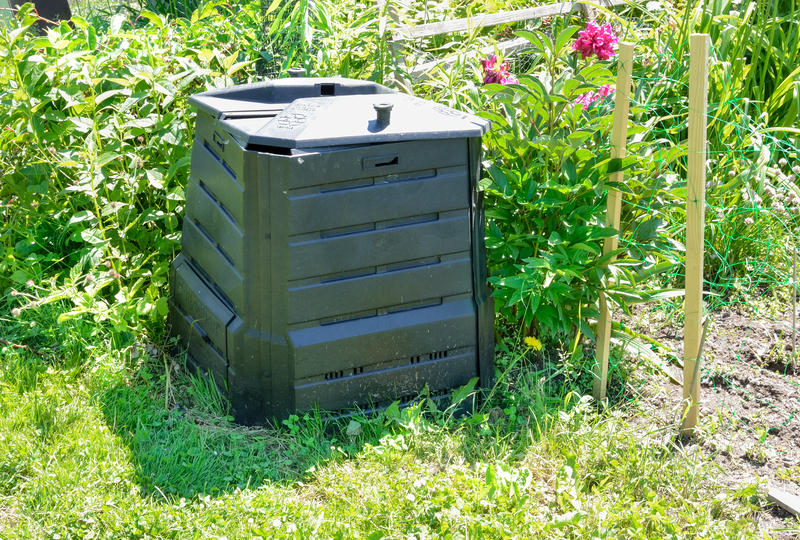Green Your Workspace with Stronger Recycling: The Ultimate Guide
In today's fast-paced work environment, sustainability has become more than just a buzzword--it's a critical cornerstone for corporate responsibility and everyday productivity. Greening your workspace with stronger recycling initiatives not only benefits the planet, but also helps foster a healthier, more engaging, and efficient work culture. This comprehensive article will guide you step-by-step, offering practical strategies to enhance your office's recycling programs and nurture an eco-conscious workplace everyone can be proud of.

Why Recycling Matters in the Modern Workspace
With businesses generating thousands of tons of waste every year, traditional landfill disposal is no longer a sustainable option. Incorporating robust recycling practices in the workplace offers significant advantages:
- Reduces landfill contributions: Paper, plastics, metals, and electronics can be recycled rather than trashed.
- Saves natural resources: Recycling conserves raw materials and energy.
- Supports corporate social responsibility: Sustainable practices reflect positively on a business's reputation and brand loyalty.
- Improves employee wellbeing: Green workspaces promote healthier environments.
- Can lower costs: Streamlined recycling can reduce waste disposal and procurement expenses.
Environmental Impacts of Inefficient Office Waste Management
Ignoring recycling in professional environments leads to unnecessary resource extraction, excessive pollution, and higher greenhouse gas emissions. Paper waste, e-waste, and single-use plastics are all culprits contributing to these problems. The more offices commit to strong recycling habits, the greater the positive impact on our planet's health.
Assessing Your Workspace's Current Recycling Status
Before launching any greener workspace initiative, it's wise to evaluate where your business currently stands. Here are some actionable steps:
- Conduct a waste audit: Identify what types of waste your office produces most (e.g., paper, plastic, electronics).
- Inspect existing recycling bins and stations: Are they easily accessible? Clearly labeled?
- Engage employees: Use surveys or informal chats to uncover recycling habits and awareness gaps.
- Review company policies: Ensure sustainability objectives are enshrined in your operational guidelines.
- Study external partnerships: Do you work with certified recycling providers?
Best Practices for Greening Your Office with Enhanced Recycling
Turning your office into an eco-champion requires a shift from "recycling as an afterthought" to "recycling as a culture." Here's how to supercharge your workspace recycling program:
1. Set Clear Green Goals
- Quantify targets: Decide to "reduce paper waste by 50%" or "recycle all office electronics responsibly within the year."
- Monitor progress: Use metrics such as waste diverted and recycling participation rates to track improvements.
2. Design an Intuitive Recycling Setup
- Standardize bins: Use consistent, color-coded bins throughout the office for paper, plastics, metals, and general waste.
- Add expert signage: Post easy-to-understand infographics highlighting what goes where.
- Centralize e-waste collection: Set up secure disposal points for old computers, batteries, and mobile devices.
3. Educate and Engage the Team
Regular education is key to successful workspace recycling:
- Host "green lunch and learns": Invite local sustainability experts to engage staff and answer questions.
- Share digital resources: Distribute infographics and recycling reminders via internal newsletters.
- Gamify recycling: Run competitions with eco-friendly prizes to encourage participation.
4. Go Beyond Bins: Encourage Reuse and Reduction
- Switch to digital tools: Reduce paper waste by encouraging e-signatures and digital documentation.
- Promote reusable supplies: Provide employees with reusable mugs, water bottles, and kitchenware.
- Revamp purchasing policies: Source from vendors with strong recycling commitments and minimal packaging.
5. Partner with Certified Recyclers
- Establish relationships: Work only with reputable, certified recycling companies for electronics, confidential papers, and plastics.
- Request transparency: Obtain reports to validate correct handling, recycling rates, and responsible disposal methods.
Leveraging Technology for Smarter Office Recycling
Technology is a powerful driver in creating a more eco-friendly workplace. Integrate these solutions to streamline your recycling efforts:
Smart Bins and Sensors
- Automated sorting: Next-generation smart bins use sensors and AI to separate waste more accurately than humans.
- Fill-level monitoring: Sensors notify custodial staff when bins are full, reducing overflow and contamination.
Workplace Recycling Apps
- Track progress: Use apps that let employees log recycling activities or report misplaced waste.
- Gamification features: Motivate friendly competition and reward top recyclers.
Cloud-Based Waste Auditing Tools
- Real-time dashboards: Analyze waste data to identify areas for improvement and cost savings.
- Automated reporting: Simplify sustainability compliance and share your green success with stakeholders.
Addressing Common Office Recycling Challenges
While the benefits of greener office recycling programs are clear, there are some frequent hurdles. Here are practical solutions:
- Contamination: Improper sorting can ruin an entire load. Train staff and use clear signage for better accuracy.
- Lack of motivation: Regularly remind staff why their participation matters and make recycling easy.
- Space constraints: Use compact bins and tall storage solutions for small offices.
- Insufficient collection services: Lobby building management for better recycling pickups or coordinate with specialty providers.
Changing Company Culture: From Top-Down to Grassroots
True change is only possible when everyone contributes. Leadership buy-in is essential, but so is grassroots enthusiasm. Appoint a "Green Team" or sustainability committee to monitor practices, gather feedback, and keep momentum high.
Innovative Ways to Green Your Workspace Beyond Recycling
While greening your workspace through stronger recycling is vital, comprehensive sustainability goes further. Here are extra measures to consider:
Opt for Sustainable Office Supplies
- Switch to recycled materials: Use office paper, folders, and stationery made from post-consumer materials.
- Choose green cleaning products: Eco-friendly disinfectants and soaps offset chemical pollution.
Improve Energy Efficiency
- Install LED lighting: Save electricity and lower your carbon footprint.
- Use power strips: Easily turn off electronics at the end of the workday.
Support Sustainable Transportation
- Encourage cycling: Provide bike racks and shower facilities.
- Facilitate public transportation and carpooling: Offer incentives like transit passes or preferred parking.
Adopt Green Certifications
- Pursue LEED, WELL, or ENERGY STAR certifications: These drive continuous improvement across sustainability areas, from recycling to indoor air quality.
Communicating Success: Share Your Green Office Story
A vital part of any workplace recycling program is transparent, consistent communication. Here's how to motivate ongoing participation and demonstrate impact:
- Celebrate milestones: Host "zero-waste" days or announce achievements on company bulletin boards.
- Share data: Publish stats like tons of waste diverted from landfill or yearly reductions in paper usage.
- Highlight green champions: Recognize individuals or teams who go above and beyond in your office recycling efforts.
- Involve the community: Donate office furniture or computers and support local environmental projects.
The Lasting Benefits of Stronger Workspace Recycling
Making the switch to a greener, more sustainable work environment through enhanced recycling delivers lasting value far beyond the office:
- Environmental stewardship: Contribute to cleaner air, water, and safer communities.
- Employee engagement: Green initiatives build pride and foster positive company culture.
- Cost efficiency: Recycling and waste reduction often lead to considerable long-term savings.
- Stronger brand identity: Clients and customers value sustainability and responsible business practices.
If every office adopts even a fraction of these tips, together we can create a ripple effect of positive environmental change.

Conclusion: Take the First Step Toward a Greener Workplace
Greening your workspace with stronger recycling measures is more than a trend--it's a responsibility that benefits people, profits, and the planet. By following the strategies outlined in this article--from auditing current practices to leveraging technology and building lasting habits--you'll set your company on a path to ecological excellence.
Ready to take action? Start by setting clear, measurable goals, empowering your team, investing in smart recycling solutions, and keeping everyone involved and inspired. The future is green--let your office lead the way!
Frequently Asked Questions: Greening Your Workspace with Better Recycling
- What materials should be recycled in an office? Common items include paper, cardboard, plastics (#1, #2), metals, glass, electronics, and batteries. Always check local guidelines for specifics.
- How can I motivate my team to recycle? Use education, competitions, easy-to-access bins, and constant communication to involve everyone.
- Is recycling expensive for small businesses? Many cities offer free collection, and significant savings can come from reducing waste disposal and purchasing recycled products.
- Can remote or hybrid offices recycle effectively? Absolutely--encourage home recycling, provide guidance, and offer drop-off points for electronics and specialty items.
Start your journey today. Green your workspace with stronger recycling and nurture a sustainable, successful future for all!